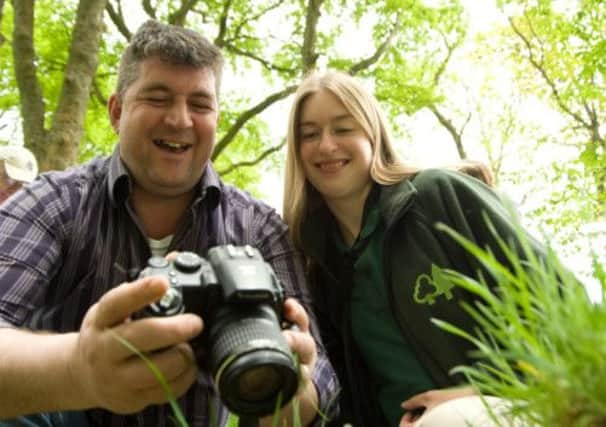Forest mental health scheme to be expanded


Branching Out, run by the Forestry Commission, began in 2007 and has just run its 100th programme, working with people in the outdoors in an effort to improve their quality of life.
Now a research study has demonstrated the benefits to patients taking part and the low costs involved.
Advertisement
Hide AdAdvertisement
Hide AdIn recent years, the focus has been on reducing the use of drugs to treat mental health problems where possible, following soaring numbers of prescriptions for antidepressants.
But with long waits for psychological counselling, many people working in the field have looked to methods such as exercise and other physical activities to improve mental health.
The Branching Out programme involves weekly sessions of activities such as forest walks, tai chi, conservation to improve the environment, art, photography and skills such as woodworking, fire-lighting and campsite cooking.
Since its launch, more than 1,000 people have taken part, with seven of Scotland’s 14 health boards now involved.
An economic analysis of the benefits of the programme used Quality Adjusted Life Years (QALYs) – a measure widely employed to assess the cost-effectiveness of treatments – to see what impact it had in giving users extra years of good health for the money spent.
Health watchdogs generally set a limit of £30,000 per QALY when deciding if a treatment represents value for money.
The analysis of Branching Out found it cost just £8,600 per QALY – well below what the NHS would be willing to spend on other interventions.
Kirsty Cathrine, Branching Out programme manager at the Forestry Commission Scotland, said they now hoped to expand into other areas, including NHS Fife by the end of the year, after further staff training.
Advertisement
Hide AdAdvertisement
Hide Ad“We have got interest from all areas – it is just a matter of capacity,” she said.
The groups take on people with conditions such as depression, anxiety and post-traumatic stress disorder.
Ms Cathrine said: “The first study we did showed that it helped people with physical activity, which is quite a big thing for mental health patients, because there is a link between mental health problems and physical problems like obesity. So getting people out and about was very good for that.
“We had great comments from people about how it had changed their lives and helped them move on.”
But she said the latest study helped to show the financial benefits, which was essential for getting funding from the NHS and other organisations.
To help make the projects sustainable and cut costs, the Forestry Commission is training NHS staff in environmental skills so they can help lead the groups.
The project has received funding from the Scottish Government, with additional cash from the NHS, charities and the Forestry Commission.
Jo Anderson, director of external affairs at Scottish Association for Mental Health (SAMH), said: “Regular physical activity can be hugely effective in the prevention and treatment of mental health problems.
Advertisement
Hide AdAdvertisement
Hide Ad“Branching Out is a great example of this and the programme had a positive impact on SAMH participants, with many reporting improvements in their physical fitness as well as their confidence and self-esteem.
“Initiatives like Branching Out are of great significance to the one in four Scots who will experience a mental health problem every year.”
Case study: ‘I enjoyed the wildlife – it really helped get me outdoors’
When 22-year-old Darren was diagnosed with schizophrenia, he was referred to one of the Branching Out projects run by the Forestry Commission.
About ten people are involved in each scheme, which can involve NHS staff as well as volunteers from the commission.
Darren, who took part in a project in Perth and Kinross earlier this year, said he was keen to take part to help him get out and about and meet other people.
“Mostly I enjoyed the walking and seeing the wildlife,” he said.
“The staff were really nice and the other people taking part were also really nice.
Advertisement
Hide AdAdvertisement
Hide Ad“It really helped getting me out of the house and getting me active.”
Darren, from Perth, said he would be keen to take part in other Branching Out programmes if he was given the chance.
While he is taking medication to help manage his condition, he said staying active and getting exercise had also helped him.
The Branching Out projects differ around Scotland, but they generally involve participants attending for three hours a week for 12 weeks.
Organisers hope this acts as a stepping stone to taking part in other mental health services by helping patients improve their physical health, encouraging a daily structure and routine, and giving them better social skills.
Those involved in running the sessions believe they help increase confidence and boost self-esteem, in combination with more conventional treatment approaches for a range of mental health conditions.
Darren added: “I think taking part in the project has helped me. I would like to take part in more sessions.”